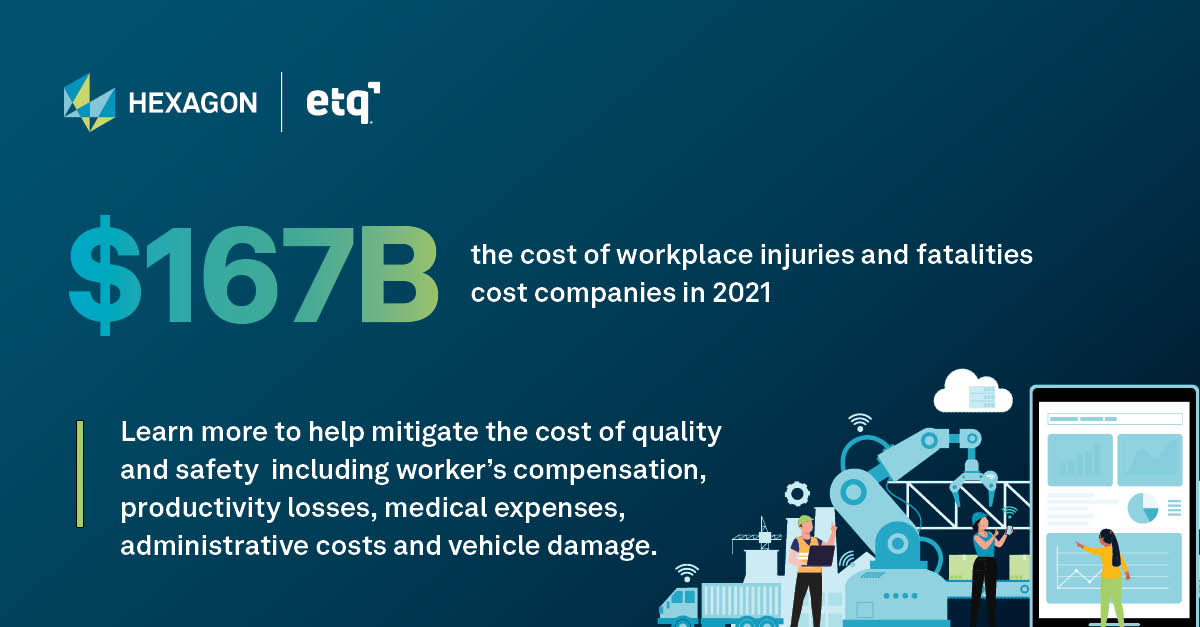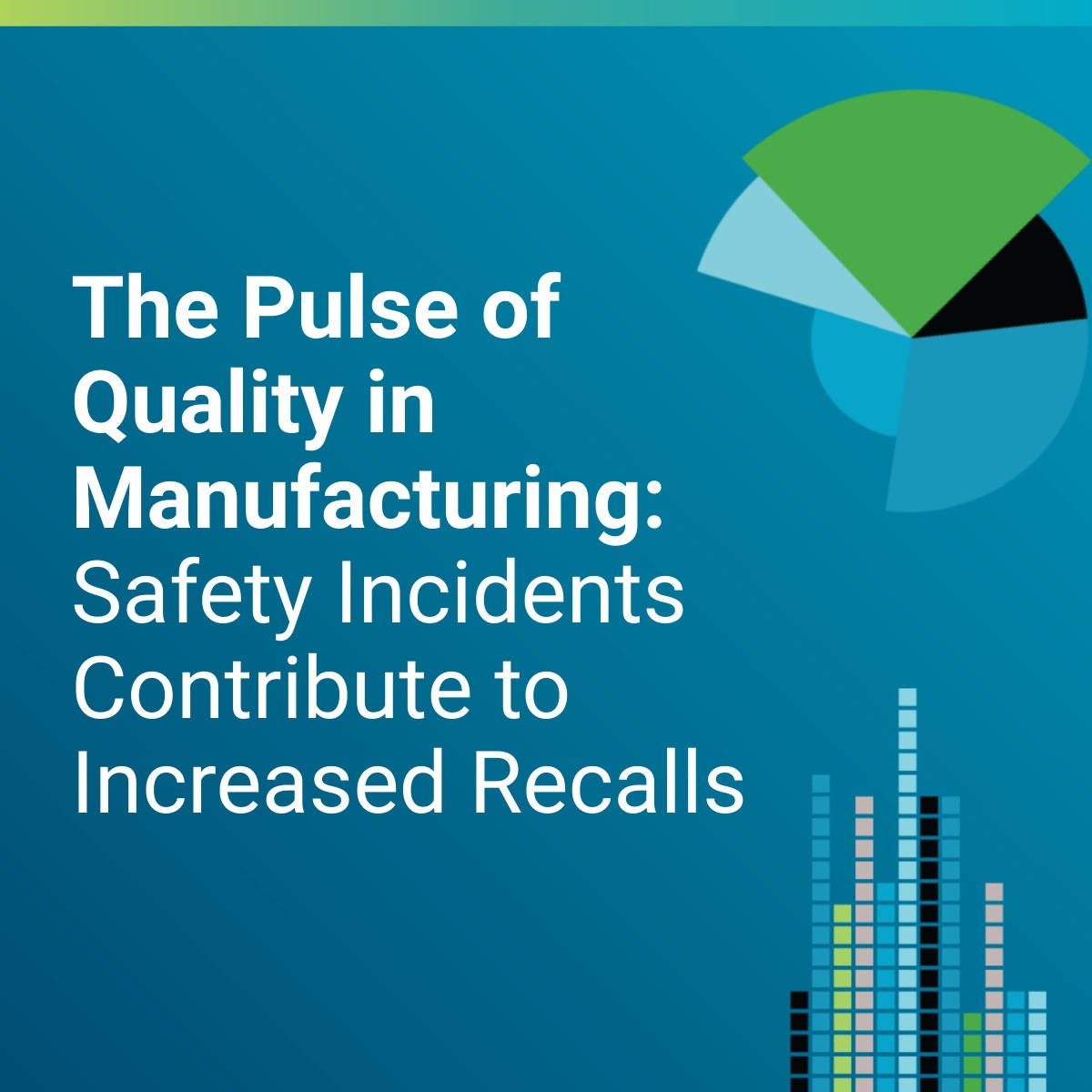The heavy manufacturing industry faces unprecedented threats from every direction. Between prolonged global trade uncertainties, market volatility, rapidly shifting consumer preferences and, most importantly, supply chains that are becoming longer, more complex and less transparent, manufacturers are facing increasing levels of risk and the potential negative impact both on the bottom line and brand reputation. With stakes this high, manufacturers can’t afford to let quality and safety problems slip through the cracks.
On the safety side, the most recent U.S. Bureau of Labor Services (BLS) data show that workplace injuries and fatalities cost companies over $167 billion in 2021, including worker’s compensation, productivity losses, medical expenses, administrative costs, and vehicle damage. The bulk of those injuries and deaths are preventable.
In fact, those are not only the quantifiable costs. In today’s social media-fueled society, news of product recalls and safety disasters travels almost instantly. In one recent study, 94% of respondents said a bad review had convinced them to avoid a business. The result can damage a company’s bottom line and an entire industry’s public image.
Of course, recall costs are just the tip of the iceberg within the larger context of warranty costs, scrap, rework and other quality costs. While reported product failures provide valuable data points, they represent just a portion of the total cost of poor quality.
Looking even deeper beyond the reported product failures are unknown quantities of defective products that are shipped undetected to consumers who never report them, opting simply to abandon the brand entirely.
Within this context, manufacturers today face a fundamental choice. On one side lies automation and the “factory of the future” concept of Industry 4.0, promising a transformation in productivity to propel future-oriented companies to market leadership. On the other is the status quo: error-prone manual processes where data is hidden in obscure spreadsheets and email chains, putting companies on a collision course with quality and safety failures.
The question is no longer whether companies will adopt these new technologies but rather just how far early adopters will pull ahead of the competition by integrating them into existing business optimization processes. Automated quality and safety systems are fast becoming a basic requirement in this highly competitive landscape, enabling manufacturers to standardize processes, improve visibility and reduce risk, dramatically reducing the cost of poor quality.
How do manufacturers ensure quality and safety while managing costs and compliance requirements across global facilities?
Manufacturers of large, complex machinery and other goods need the right tools to help them meet this rapidly changing environment. And they need to be able to manage globally while having the flexibility to meet local needs. Many manufacturers leverage an electronic quality management system (eQMS) to meet these challenges and so much more.
1. Reduce cost of poor quality:
Poor quality management practices have also directly contributed to waste. According to the American Society for Quality (ASQ), quality costs total as much as 40 cents of every dollar of revenue and form part of the so-called “hidden factory” of process inefficiency that actively undermines quality.
An eQMS helps organizations identify issues behind poor quality by answering questions such as: are there systemic issues and nonconformances, what are the root causes, were suppliers part of the problem, how much rework is being done, what are our warranty costs?
2. Improve supplier quality:
Suppliers are a critical partner for any manufacturer. The pandemic altered the basic structure of supply chains and how manufacturers collaborate with their suppliers. In fact, today, suppliers can provide up to 75% of the total value of a finished product. In other words, a supplier quality problem is a manufacturing quality problem.
To ensure quality issues are not exacerbated by the need to meet market demand, comply with customer requirements and manage supply chain issues, an eQMS is essential. Tracking customer and industry requirements, managing supplier communications, being ready for the inevitable audits, and collecting compliance data for analysis and decision-making are all key functions of an eQMS.
3. Drive safety throughout the organization:
As described above, compliance with safety requirements not only is a requirement, it just makes good business sense. A safety incident is a quality incident, leading to a higher cost of quality, slower time to market, and the potential for significant penalties.
An eQMS that also has strong set of safety features can help manufacturers understand the total cost of quality while addressing safety issues. Tracking and reporting on safety incidents is necessary to identify the root causes and address identified issues. Compliance doesn’t mean simply remediating the issues. As OSHA and other regulatory agencies step up observation and perform audits – an eQMS will ensure manufacturers are prepared for these activities.
Manufacturing’s strongest brands trust ETQ Reliance to deliver quality and safety
Heavy manufacturing industry leaders leverage ETQ Reliance®, a comprehensive yet adaptable electronic eQMS platform, to ensure that their quality management systems can seamlessly and cost-efficiently scale as their business evolves and quality and compliance demands change.
Wabtec
Wabtec is the largest manufacturer of diesel-electric locomotives in North America. The company also manufactures equipment for the railroad, marine, energy, and mining industries. In 2010, the company saw an uptick in product failures totaling over $100 million annually, traced back in part to a lack of visibility among legacy quality tools ranging from spreadsheets to old mainframe applications.
With ETQ Reliance, Wabtec was able to eliminate these legacy apps to bring all of its QMS under a single, enterprise-wide platform, integrating processes such as supplier management, production part approval process (PPAP), and inspection status tracking.
Results:
- 25% reduction in defects per unit
- Reduced cost of quality by 20%, saving $30M in quality program costs
- $10-12M in productivity gains over nine years
GM
General Motors (GM) is one of the largest automakers in the world, with over 180,000 employees and manufacturing facilities in 37 countries. Prior to implementing ETQ Reliance, the company struggled with manual data collection, reporting, and audit processes that were costly and inefficient to manage in siloed systems. The company chose ETQ Reliance for its flexibility and ease of use, using the software to standardize EHS audits, manage supplier costs, and eliminate the use of external consultants for plant decommissioning.
Results:
- Took in $1M+ in scrap revenue and saved $160,000 on a single decommissioning project
- Ensures compliance with complex federal and state regulations
- Automates supplier tracking for monthly savings reports, freeing up resources while improving accuracy
“Our information isn’t siloed anymore. We can show value immediately, like in the tear-out work where information from barcode scans on decommissioned items is directly available to the finance department through ETQ Reliance.” – Joel Wolf, Staff Solutions Architect, General Motors.
Rheem
Rheem is North America’s largest manufacturer of water heating products, as well as heating, cooling, pool, and commercial refrigeration products. The company previously faced significant QMS challenges around expanding and changing its processes to meet evolving business needs. Rheem implemented ETQ Reliance to track ISO compliance and supplier management and to develop a custom workflow to standardize and streamline how users create new QMS applications.
Results:
- 3,000 person-hours saved on three projects
- $94,000 saved in the first year
- Total ROI 650%
Cooper Tire
Cooper Tire is a global manufacturer of tires for cars, SUVs, and light trucks. It has been operating since 1914 and is known for its commitment to quality. After moving strictly from the after-market replacement tire business into supplying automakers directly, the company needed a way to document compliance with IATF 16949, an automotive industry standard built on top of ISO 9001 requirements. Originally deploying ETQ Reliance to handle document control, the company now uses the software to manage audits, employee training, and more, making Reliance the QMS of record for all quality assurance processes in plants across ten countries.
Results:
- Reduces scrap costs
- Lower overall cost of quality
- 80% reduction in audit administrative time



